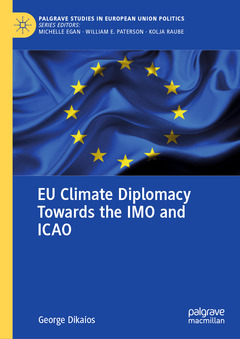Description
EU Climate Diplomacy Towards the IMO and ICAO, 1st ed. 2024
Palgrave Studies in European Union Politics Series
Author: Dikaios George
Language: English
Subject for EU Climate Diplomacy Towards the IMO and ICAO:
243 p. · 14.8x21 cm · Hardback
Description
/li>Contents
/li>Biography
/li>Comment
/li>
This book delves into the topic of the European climate diplomacy and the ways it is performed, both internally in terms of constructing a negotiating position, and externally in regards to how the European Union (EU) as a whole exports this position at the international level. To do that, the analytical framework is built around two major pillars: first, the literature on European public policy, specifically regarding policymaking, and second, the Normative Power Europe approach. Aiming to test whether European climate diplomacy actually works, the book utilizes two examples/case studies, namely the International Civil Aviation Organization (ICAO) and the International Maritime Organization (IMO). The selection of these examples is based on an array of rationales, but the main reason is that both international organizations (IOs) do not contribute (at least their fair share) in the global efforts of tackling climate change. The book thus showcases the strategically driven efforts of the EU as whole to export its climate norm to these two IOs. It argues that, if it weren?t for the EU, these two organizations would not have been active in negotiating on climate change issues to such extent.
1 Introduction and context.- Shaping the field: Normative Power Europe, the EU climate norm and EU (climate) diplomacy.- 3 Performing normative EU climate diplomacy: An analytical framework.- 4 Internal EU climate diplomacy: Opening the black box.- 5 Performing normative climate diplomacy at the international level.- 6 Concluding remarks: Navigating in uncharted seas and skies.
George Dikaios is affiliated to the Department of Political Science and Public Administration & the Department of Ports Management and Shipping of the National and Kapodistrian University of Athens, Greece. He is also a Senior Research Fellow of the UNESCO Chair on Climate Diplomacy.




